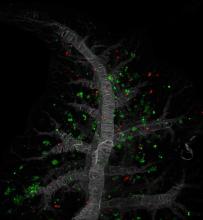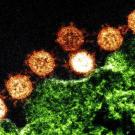News
Solving the Mystery of a Stubborn – and Common – Cancer Gene
One of the major successes of decades of cancer research has been the development of drugs that specifically inactivate oncogenes, genes that function abnormally, causing cells to behave erratically, become malignant and make tumors. These drugs are highly effective treatments for cancers caused by
UCSF Is Top Public Recipient of NIH Funding for 15th Year
For the 15th year in a row, UC San Francisco garnered the top spot among public institutions in funding from the National Institutes of Health (NIH) in 2021. UCSF continued to rank highly among all public and private institutions nationwide, ranking fourth overall. The University was awarded nearly
Immune Cells Leave Fingerprints on Tumors Metastasized to the Brain Offering Clues to Future Therapies
Using data from over 100,000 malignant and non-malignant cells from 15 human brain metastases, UCSF researchers have revealed two functional archetypes of metastatic cells across 7 different types of brain tumors, each containing both immune and non-immune cell types. Their findings, published the
3 Researchers Named 2021 Fellows of American Association for the Advancement of Science
Three UC San Francisco researchers have been selected as 2021 fellows of the American Association for the Advancement of Science (AAAS), the world's largest multidisciplinary scientific society and a leading publisher of cutting-edge research through its Science family of journals. They are among
UCSF Researchers Receive 2021 ASPIRE Awards for High-Risk, High-Reward Projects
Three scientific research projects led by UCSF investigators have been selected to receive 2021 ASPIRE Awards by the Mark Foundation for Cancer Research. The Mark Foundation's ASPIRE (Accelerating Scientific Platforms and Innovative Research) program enables innovative approaches to solving
Addressing High Lung Cancer Rates Among Female Asian Non-Smokers
While smoking is the top risk factor for lung cancer, Asian women in the United States who have never smoked are currently twice as likely to develop the disease than female non-smokers of other ethnicities. The FANS (Female Asian Never Smokers) Study aims to collect data from Asian American women
Human Proteins Behind COVID-19 Infection Revealed by Innovative CRISPR Technology
In the quest for new treatments for COVID-19, a team led by researchers at UC San Francisco has identified a new potential drug target that may block infection by SARS-CoV-2. The protein, called BRD2, regulates the ACE2 receptor, which the novel coronavirus relies on to gain entry to its host’s









